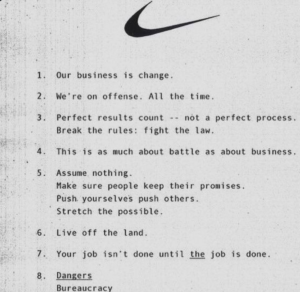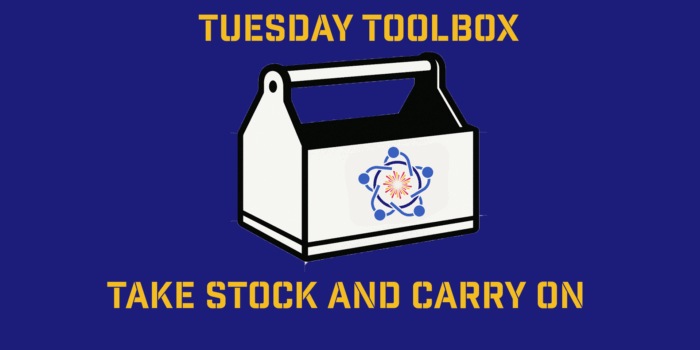Inc magazine shares a one-page memo that set the tone and course for Nike’s culture. Do your people know what’s important to your company?
BY JEFF HADEN, CONTRIBUTING EDITOR, INC.@JEFF_HADEN
Routines are handy, but rules — deciding what you will or will not do in certain situations, without fail — are much more powerful.
That’s why effective leaders follow the On the Dot Rule for meetings; research shows meetings that start even a minute late are significantly less productive. That’s why Google uses the Power-Law Rule to pay superstar employees “unfairly.” That’s why successful people use the Two-Week Rule to build a new habit.
And that’s why, in 1977, Nike director of marketing Rob Strasser circulated a memo he called “Principles.” Some of his 10 points are rules. Some are perspectives.
All were words he wanted his team to live by:

Some of the rules establish expectations. “Your job isn’t done until the job is done” makes it clear Strasser didn’t see Nike as a 9-to-5 workplace. “Live off the land” clearly indicates Strasser expected people to solve problems through creativity and imagination — not by throwing money at them.
Number 10 is particularly telling. “If we do the right things we’ll make money damn near automatic,” while awkwardly worded, frames making profits as a result, not a goal. As HubSpot co-founder Dharmesh Shah says, “Stop thinking about making a million dollars, and start thinking about serving a million customers.”
That’s the thing about rules. Rules create habits. Embracing the fact your job isn’t done until the job, whatever you set out to do, is done eliminates the need for willpower. You don’t have to talk yourself into staying the course. You don’t have to bribe yourself to stay the course.
Follow your rule enough times and you won’t even think about it.
You will, um, just do it.



